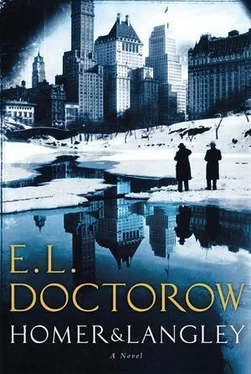WHAT LANGLEY DID by way of cheering me up was to buy us a television set. I did not even try to understand his reasoning.These were the early days of television. I touched the glass screen — it was square with rounded sides. Think of it as pictorial radio, he said. You don’t have to see the picture. Just listen. You’re not missing anything: what is static on a radio is like it’s snowing on the TV. And when the picture does clear, it tends to float up off the screen only to rise again from the bottom.If I was not missing anything why bother with it? But I sat there in the interest of science.Langley was right about the relation to radio. Television shows were structured like radio programs, coming in half-hour segments, or sometimes even whole hours, and with the same daytime soap operas, the same comedians, the same swing bands, and the same stupid advertising. There was not much point to my listening to television unless it was a news broadcast or a game show. The news was all about Communist spies and their worldwide conspiracy to destroy us. That was hardly cheering, but the game shows on television were another matter. We got into the habit of tuning them in mostly to see if we could answer the questions before the contestants did. And we were able to do that quite often. I knew the answer to almost anything having to do with classical music and, because of my time playing records for the tea dances, I’d come up with a fair guess or two about popular music. And I was pretty good with baseball and literature. Langley knew history and philosophy and science to a fare-thee-well. Who was the first historian, the quizmaster asked. Herodotus! said Langley. And when the contestant was slow to answer, Langley shouted, Herodotus, you idiot! as if the fellow might hear him. That made me laugh and so it became our habit to call those people on the shows idiots. How far was the sun from the earth? Ninety-three million miles, you idiot! Who wrote Moby-Dick? Melville, you idiot! And even when a contestant happened to come up with the right answer, listening, say, to the opening phrase of Beethoven’s Fifth — Da-da-da-dum, the same three shorts and a long that in Morse code meant the V, which made it a popular piece during the war — and saying the composer was Beethoven, we’d shout, Good for you, you idiot!Given our success rate with these game shows, we naturally considered offering ourselves as contestants. Langley did a little research as to how to go about it. Apparently there was a great demand for slots on these shows, and why not, as there was money to be made. One sent in a C.V. and had interviews and background checks, just as if the show was produced by the FBI. We gave ourselves a test listening to one half-hour show and we broke the bank. The trouble was, Langley said, that we were too smart. There would be no suspense. And Homer, these contestants who come on smiling like fools, they are an embarrassment. When they win something, they jump up and down like marionettes on a string. Would it be worth the money to you to carry on like that? No? I said. I agree, he said. It’s a matter of self-respect.And so we chose not to proceed. Of course I had some idea at the time that we were not sartorially typecast. He had told me the men predictably wore flannel suits and rep ties and crew cuts and women down-to-the-ankle skirts and blouses with big collars and bangy hairdos. Langley, who was now bald on top, had let the gray hair on the back of his head grow down to his shoulders. My own Lisztian fall from its center part was considerably thinned out. And our preferred dress was army greens and boots, leaving to the moths in the closets our old suits and blazers. We couldn’t have gotten past the front door.
CHRIST, IF THERE was ever an invention nobody needed, Langley said. By then we had another couple of TVs that he had found somewhere. None of them had worked to his satisfaction.When you read or listen to the radio, he said, you see the scene in your mind. It’s like you with life, Homer. Infinite perspectives, endless horizons. But the TV screen flattens everything, it compresses the world, to say nothing of one’s mind. If I watch any more I’d might as well take a boat down the Amazon and have my head shrunken by the Jivaro.Who are the Jivaro?They are this jungle tribe that likes to shrink heads. It’s their custom.Where did you hear that?Read it somewhere. After you decapitate the guy you make a slit from top of the head down the back of the neck and then peel the whole thing off the skull — neck, scalp, and face. Sew it into a pouch, stitch up eyelids and lips, fill it with stones, and boil the damn thing down till it’s the size of a baseball.What does one do with a shrunken head?Hang it by a hair along with the others. Tiny human heads in a row swinging gently in the breeze.Good Lord.Yes. Think of the American people watching television.
BUT BEFORE WE unplugged the TV forever, it happened that they were televising the hearings of a Senate committee investigating organized crime. Let’s just look at that, Langley said, and so we tuned in.Senator, a witness was saying, it’s no secret that in my youth I was a wild kid, and I grew up the hard way, meaning I did time. That juvenile rap is like a dead bird around my neck and so you subpoeny me here.Are you denying, sir, that you are the head of New York’s leading crime family?I am a good American and I sit down with you because I got nothing to hide. I pay my taxes, I go to church every Sunday, and I give to the Police Athletic League, where they keep kids playin’ ball and out of trouble.Good God, I said, do you realize who that is? It must be! I’d recognize that voice anywhere.If it is he’s heavier, Langley said. Dressed like a banker. Most of his hair’s gone. I’m not sure.Who doesn’t change in twenty-five years? No, it’s him. Listen to that: How many gangsters speak in a whisper with an attached wheeze in high C? That’s Vincent all right. He asked me how it felt to be blind. And now he’s at the top of his profession. He’s a big muck-a-muck in front of a Senate committee. He sent us champagne and girls, I said. And then we never heard from him again.Did you hope to?I was being idiotic, I know, carrying on about this hoodlum. I wasn’t the only one. I don’t remember what he actually testified to but after his appearance the tabloids were all over him. I had Langley read to me: “Vincent Rats!” they screamed in their headlines as if it was they who’d been betrayed. And then their accounts of the rackets he was alleged to be running, his competitors who had mysteriously died, the various courtroom trials from which he’d emerged with an innocent verdict, thus affirming a guilt so vast that the law could not get around it, and, what was most suspenseful, the arch enemies he was reputed to have made among the other crime families. I was very impressed.Langley, I said, what if we had been a crime family? How much closer we would have been to Mother and Father if we had all worked together running protection rackets, gambling syndicates, loaning money to people at exorbitant rates, committing every imaginable felony including murder though I think not prostitution.Probably not prostitution, Langley said.
AFTER THE SENATE HEARINGS, Langley had pulled the plug and thrown the TV set into a corner somewhere, and we were not to look at television again until a decade later when the astronauts landed on the moon. I never told my brother that in my own way I could see the television screen: I saw it as an oblong blur just a shade lighter than the prevailing darkness. I imagined it as the eye of an oracle looking into our house.My thrill at having once met a famous gangster was indicative of how bored I was by my own life. When, a few weeks later, a news bulletin came over the radio that Vincent had been shot while dining in an East Side restaurant, it was a weird pride I felt — the sense of being a privileged insider, an I-knew-him-when feeling that was quite insensitive to the extremity of his situation. After all, I was a fellow who sat most of the day in his house, living without the normal complement of friends and associates, and with no practical enterprise to occupy his days, a man with nothing to show for his life but an overworked consciousness of it — who can blame me for acting like a fool?It was that testimony he gave, I said to Langley. The crime families don’t like publicity. The Mayor feels pressure to do something, the D.A. gets busy and the cops start pulling them in.All at once, you see, I was the expert criminologist.I waited by the radio. Diners had seen Vincent being carried to his limo and driven away. Was he alive or dead? I was left with a vague sense of expectation. That is something less than a premonition but can be just as unsettling. Jacqueline, when you read this, if you do, you might think, Yes, at this point of their lives poor Homer was losing his mind. But forget the oracular power I imputed to a TV set and you are left with an improbability that had a certain logic to it. I think now what happened I had wanted to happen, though what I will describe here was finally only one more passing event in our lives — as if our house were not our house but a road on which Langley and I were traveling like pilgrims.
Читать дальше












